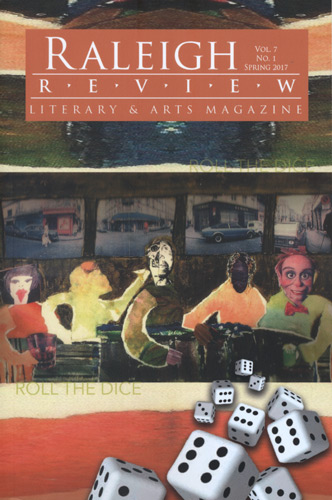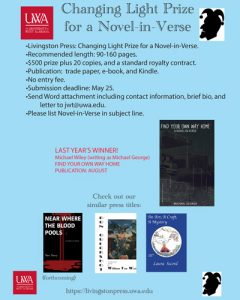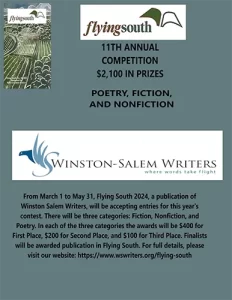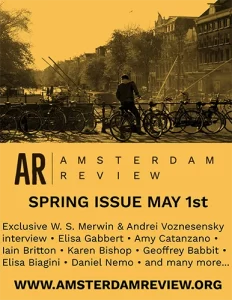Raleigh Review – Spring 2017
The Spring 2017 issue of the Raleigh Review provides its own summary in the editorial preface: it “captures the harmful attempts of the erasure of lineage, erasures of peoples, of civilizations, of families, of languages, of dialects as it relates the self to history and to place.” The poetry, the fiction, and the art direct us to a thoughtful reflection on our times and to an enriching artistic experience.
The Spring 2017 issue of the Raleigh Review provides its own summary in the editorial preface: it “captures the harmful attempts of the erasure of lineage, erasures of peoples, of civilizations, of families, of languages, of dialects as it relates the self to history and to place.” The poetry, the fiction, and the art direct us to a thoughtful reflection on our times and to an enriching artistic experience.
The goal the writers and editors have set for themselves is exemplified in such poems as Joshua Lee Martin’s “Letter in a Drought”:
Even God, it seemed, had abandoned
this place where crops dreamed of rain in their seeds,
where the faint trace of mud-splatter
could make anyone believe that this land
wasn’t turning to dust like a high country Sodom.
The lament for lost places has a variety of locales, though there is little change in the tone that the issue’s theme carries throughout. There is JR Tappenden’s “Fetish” for Detroit:
Former factory, former church, former
train shed or hospital, form follows
the function of absence, no |erasure|.I crave the safety of a sterile field. Surely the patient was numb
when the granite steps were pried away. Was still under
while I shooed away the pigeons. Remainsunaware. Remaindered |rendered| beauty
I want to pin to my wall, a fractal of rust
and lichen, growth patterns flattened.
Teach me again. I do not own this body.
There is a balance in the presentations between the social and the personal, but no loss in the messages. There is balance Erin Rose Coffin’s “What Descends into Flesh” which depicts the cycle of life and motherhood:
In Charlotte, my mother sits
in the garden of St. Gabriel’s.
She whispers to the wall
where her own mother rests,
an urn set in concrete.
She fingers an inherited rosary,
speaks to the Virgin Mary, asking
about pain, wants to know if leaving
is like a long blink, or like suffocating.
She leans in, waits for an answer,
but what more can we know?
Silent, she feeds no one
and no stone feeds her.
The fiction continues the personal and social themes with such pieces as Sharon Mauldin Reynold’s “The Geographic Center of Nowhere,” Kritika Pandey’s “Dirty White Strings,” and Ben Feldman’s “Jed, Get With It” which details Jed’s problems, a balance of the social and personal:
First, there’s the matter of finding love. Jed is forty and unmarried. He doesn’t have a girlfriend, lover, or friend providing benefits. No house or child, let alone two or three. Without a child, he can’t know the true meaning of life. Or busyness. He currently goes on .7 dates per month.
The poetry and fiction are reinforced by the artwork of Joan Fullerton. Her seven pieces are well placed to provide a backdrop of imagery for the authors and their themes.
In addition, this issue includes four reviews of longer works and collections of poetry by poets Andrea Jurjević, Alan Shapiro, Cheryl Dumesnil, and A. Molotkov.
With a good balance of poetry, art, fiction, and reviews, this issue of the Raleigh Review fulfills its promise to capture the attempted erasure of our heritage, history, and place.
[www.raleighreview.org]





